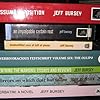Ask the Author: Jeff Bursey
“Ask me a question.”
Jeff Bursey
Answered Questions (3)
Sort By:

An error occurred while sorting questions for author Jeff Bursey.
Jeff Bursey
Simon, hi. Just saw your question. Thanks for it.
Kant might argue that it was his duty to make my verse or prose more sensible and logical, and correct my vision so that it was morally upright, even though he may not want to carry out those duties, but being Kant it's the doing of unpleasant duties that counts more on this earth and in heaven than doing something pleasurable that may also be a duty. In short, he'd be John Gardnerish as an editor. But it's possible that maybe after being resurrected some centuries after his death he'd be a little more humble and mellow.
Kant might argue that it was his duty to make my verse or prose more sensible and logical, and correct my vision so that it was morally upright, even though he may not want to carry out those duties, but being Kant it's the doing of unpleasant duties that counts more on this earth and in heaven than doing something pleasurable that may also be a duty. In short, he'd be John Gardnerish as an editor. But it's possible that maybe after being resurrected some centuries after his death he'd be a little more humble and mellow.
Jeff Bursey
Sorry, Ken, I'm just getting to this. I hope your book talk went well.
regards,
Jeff
regards,
Jeff
Jeff Bursey
W.D., hello. Sorry for the delay, I rarely look at this section in my Dashboard.
I have a bunch of notes about the first 139 pages of Sascha's book. It's been a while since I looked at it, but I do remember thinking that the theory was, in large part, new to me, so learning took place, and also that Sascha is very inclined to politics, in a large sense (not for a party but maybe for an idea), as his views on a larger europe -- oh how that must sound now! -- meant the erasure of the nation-state in favour of a, well, postnational entity, which would mean what on the ground?, and not on paper or in papers, with unforeseen ramifications that Habermas et al might not have predicted.
I stopped just before he really got into Pynchon so I'm not sure that the above is helpful. Right now I'm in a wonderful lull between deadlines for reviewing books for publications so perhaps I'll get the chance to finish this book and have more to say in better words. It's all about the words, right?
For now, I'd say if you were interested enough to contribute to Against the Grain, then this book would likely appeal. Is there a good (university) library where you are?
I have the book you're in, as well, and now have added reason to get to it in the sometime future.
Jeff
I have a bunch of notes about the first 139 pages of Sascha's book. It's been a while since I looked at it, but I do remember thinking that the theory was, in large part, new to me, so learning took place, and also that Sascha is very inclined to politics, in a large sense (not for a party but maybe for an idea), as his views on a larger europe -- oh how that must sound now! -- meant the erasure of the nation-state in favour of a, well, postnational entity, which would mean what on the ground?, and not on paper or in papers, with unforeseen ramifications that Habermas et al might not have predicted.
I stopped just before he really got into Pynchon so I'm not sure that the above is helpful. Right now I'm in a wonderful lull between deadlines for reviewing books for publications so perhaps I'll get the chance to finish this book and have more to say in better words. It's all about the words, right?
For now, I'd say if you were interested enough to contribute to Against the Grain, then this book would likely appeal. Is there a good (university) library where you are?
I have the book you're in, as well, and now have added reason to get to it in the sometime future.
Jeff
About Goodreads Q&A
Ask and answer questions about books!
You can pose questions to the Goodreads community with Reader Q&A, or ask your favorite author a question with Ask the Author.
See Featured Authors Answering Questions
Learn more

